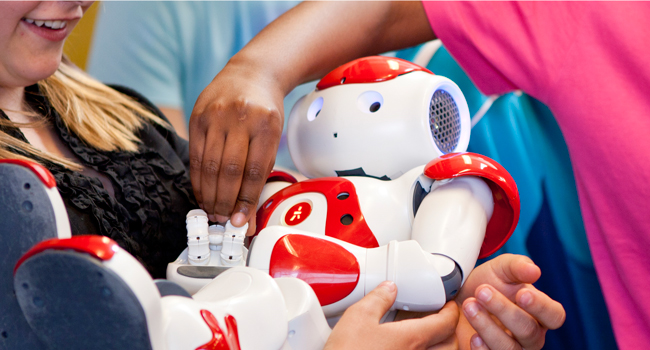PhD Thesis by Lykke Brogaard BerteL: PEERs: Persuasive Educational and Entertainment Robotics - A Design-Based Research Approach to Social Robots in Teaching and Learning
This thesis investigates the potential of social robots in education and develops the concept of Persuasive Educational and Entertainment Robotics (PEERs). The concept of PEERs is informed by theories, design principles and related research in Persuasive Design, Human-Robot Interaction and learning design.
The applicability of the concept to real-world learning environments is explored through three independent case studies using existing robotic platforms; the zoomorphic PARO seal and the humanoid robot NAO in diverse and complex educational settings: autism education, formal and informal learning in a health education setting and cross-disciplinary projects related to Science, Technology, Engineering and Math (STEM) in primary and secondary education.
The research method is inspired by Design-based Research, focusing on defining and refining methods and guidelines for involving teachers and practitioners in the development of robot-supported designs for learning and on applying and evaluating these designs in practice, in natural settings and in collaboration with users.
The dissertation is paper-based and contains two separate parts: a collection of five published research papers and a ‘wrapping’ comprising five chapters that link the papers to overall theoretical, methodological, empirical and ethical aspects of the thesis.
The project’s main contributions are revised persuasive principles for the design and application of social robots in education as well as methodological guidelines for involving users and practitioners in the design of robot-supported persuasive interventions. Furthermore, the project documents concrete and practical experiences with the two robots as mediating objects in educational settings. Through theoretical and empirical inquiry a particular theme has emerged: the symmetry of the interaction between a child, teacher and a social robot and a surprising persuasive potential in the robot’s ‘inferiority’ to the child (because of technical flaws and inherent insufficiency, or because it is contextually articulated as such). Thus, this thesis particularly focuses on the notion of being a ‘peer’ as a possible key to motivation and persuasion in human-robot relationships for learning.
This industrial PhD project is a collaboration between the Danish Technological Institute, Center for Robot Technology and Center for Health and Human Interaction Technologies and Aalborg University, Department of Communication and Psychology. The project is partly funded by the Danish Agency for Science, Technology and Innovation.
Download the thesis:
PEERs: Persuasive Educational and Entertainment Robotics - A Design-Based Research Approach to Social Robots in Teaching and LearningAbout Lykke Brogaard Bertel

